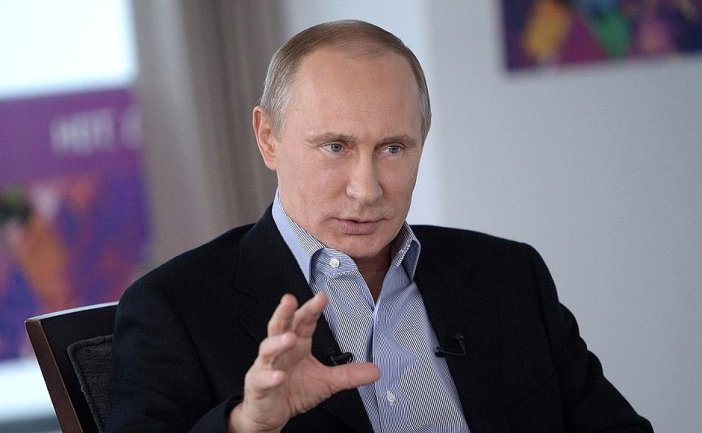“We have made a decision to create a new federal executive body within the Ministry of Internal Affairs, namely the National Guard,” the president said Tuesday.
The National Guard “will be fighting terrorism, organized crime, all in close cooperation with the Ministry of Internal Affairs. They will also continue to perform the functions which are currently carried out by riot police units, SWAT, etc.,” he added.
The National Guard will be formed out of existing Interior Ministry troops.
“We thought about how to improve [the work of law enforcement] in all areas, including those related to fighting terrorism, to organized crime and illicit drug trafficking,” Putin said.
The statement came as Putin met Interior Minister Viktor Kolokoltsev, head of the Federal Drug Control Service Viktor Ivanov, and the commander of the interior troops of the Ministry of Internal Affairs, Viktor Zolotov.
Viktor Zolotov, ex-commander of the Internal Troops and former head of the President’s personal security service, has been appointed as the leader of the new structure, with orders to report directly to the president, Kremlin spokesman Dmitry Peskov told journalists on Tuesday.
He also drew attention to the fact that Zolotov “has grand experience in [the work of] special forces. This is a very good basis for managing a body such as the National Guard.”
The National Guard will not perform field investigation activities, but they will be involved in fighting terrorism within the country, he added. It is not yet clear, however, whether these troops will be taking part in counter-terrorism operations abroad, according to the spokesman.
Peskov said that the National Guard will work to protect public safety and order along with the Ministry of Internal Affairs.
Peskov added that the changes in the structure of internal troops do not mean a loss of confidence in them, stressing that the move is aimed at improving their combat capabilities and increasing their effectiveness.
The creation of the new department will require improving the existing legal regulatory framework, as well as setting up ties with other agencies dealing with state security, especially the National Anti-Terrorism Committee, for coordination, he added.
No increase in staffing will be needed, according to Peskov. Moreover, “a combination of merging the Federal Drug Control Service and the Federal Migration Service with the Ministry of Internal Affairs, and the allocation of internal troops into the National Guard will optimize the entire structure,” he explained.
Legislators welcome National Guard
State Duma representatives have welcomed the President’s decision. Michael Starshinov, head of the inter-factional group on the interaction of civil society with law enforcement and intelligence agencies, considers the creation of the National Guard the State’s response to the current challenges.
“I can only support the president’s decision, because it corresponds with the logic of reforming the judicial system in general and the Ministry of Interior in particular. This step, of course, is also a response to modern challenges and threats, primarily from the international terrorism” Starshinov told reporters.
The deputy chairman of the Duma committee on security and corruption control, Andrey Lugovoy, expressed his hope for positive changes from the creation of the new structure. “The fact that the internal forces will obtain new duties – fighting against organized crime and terrorism – I would expect that the effect of this will be positive,” Lugovoy said.
Franz Klintsevich, first Deputy Chairman of the Federation Council Committee on Defense and Security, noted the National Guard will not have to answer to a long hierarchy of superiors, which will make decision-making easier and faster. “[The National Guard will] possess the maximum resources to fight terrorism, including the best forces from the Interior Ministry troops – the people, as they say, proven in combat. It will be endowed with ample powers laid down by federal law [and] will be able to make decisions quickly, without wasting time on all sorts of coordination.”
State Duma deputy from the party ‘Spravedlivaya Rossiya’ Tatyana Moskalkova also welcomed the news, predicting great improvement to the effectiveness of internal troops.
“The task of combating crime involves the use of specific tools, which are owned by internal troops. [Internal troops] use this special knowledge and special tools to deal with the most dangerous criminal manifestations, such as terrorism, hostage taking, hijacking and riots. The forming of the National Guard is a step toward strengthening the structure [of security forces] and finding new solutions to these security problems,” she said.
RELATED:
PUTIN, A GREAT PRESIDENT & SYRIAN’S ALLY
While Putin has amazed the internet with an impromptu interpretation for a German politician in St. Petersburg, that is only one of many episodes when Russia’s president proved he could break any language barrier to convey a message or discharge tension.
Thursday’s incident at a St. Petersburg forum, which saw Putin casually translating for former State Secretary of the German Defense Ministry, Willy Wimmer, went viral, with the latter only half-jokingly suggesting that the Russian leader’s skills were worth including in the Guinness Book of World Records. RT recalls five memorable episodes when Putin didn’t shun the opportunity to speak a foreign language in public.
SOURCES:
RT News
South Front
Submitted by SyrianPatriots
War Press Info Network at:
https://syrianfreepress.wordpress.com/2016/04/09/russ-national-guard/
~













No comments:
Post a Comment